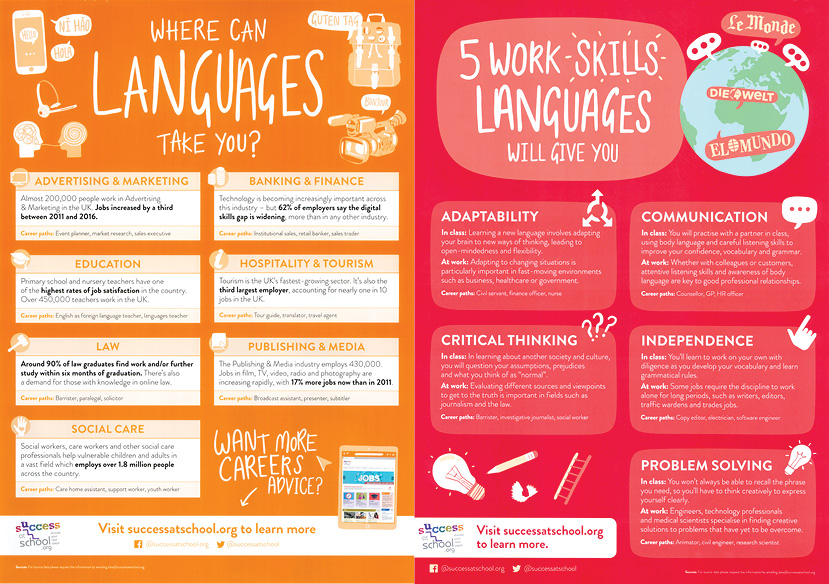French
Key Stage 3 (Year 7-9)
Year 7
Module 1 – Getting to know French – Phonics and sentence structure / Use of infinitives – Present tense -ER verbs (full verb paradigm) and opinion phrases (aimer, détester, préférer)
Module 2 – Regular verbs in the present tense (Mes passetemps) – Use of full verb paradigm and opinion phrases (aimer, détester, préférer)+ introducing a range of verbs
Module 3 – Regular verbs, nouns and gender with adjectives
(Mon collège, Ma Ville) – Describing what we do at school and in town using a range of regular verbs.
Module 4 – Irregular verbs – Avoir, être (Ma famille, mes amis et moi) – Describing friends and family – être with adjectives. Describing appearances using avoir.
Module 5 – Using irregular verbs faire & aller; The Near Future Tense
(Mon voyage en France) – Scheme of Learning building towards a day trip to France for the year 7 cohort studying French.
Year 8
Module 1 – Recap of key concepts covered in year 7 course including the role of the infinitive, the process of conjugation and the subject pronouns in French. Use of present tense -er/-ir/-re verbs, irregular verbs (avoir, être, aller and faire), negatives, articles. Introduction to the perfect past tense.
Module 2 – Perfect tense with avoir regular and irregular (boire, faire, prendre, voir)
The perfect past tense with être + imperfect examples, c’était and j’étais. Use of interrogatives.
Module 3 – adjectives, agreement, reflexive verbs, possessive adjectives + irregular verbs in present and past tense, venir, aller faire, être, future tense (using 3 tenses).
Module 4 – adjectives, comparatives, possessive pronouns, prepositions, irregular verbs, boire, prendre, il faut + infinitive
partitive article + using 3 tenses
Module 5 – modal verbs, vouloir, devoir, pouvoir, possessive adjectives, comparative and superlative, imperative forms
Year 9
Module 1 – Using present tense verbs, direct object pronouns, the near future tense, the perfect tense + three tenses together.
Module 2 – Using “à” + definite article, il faut, the near and simple future, negatives
Revision of etre, avoir, faire and aller
Using three tenses
Module 3 – Using masculine and feminine nouns, modal verbs, the imperfect tense, practising the future and imperfect tenses
Using three tenses
Module 4 – Asking questions using inversion, the conditional, reflexive verbs, tense combination + using emphatic pronouns
Module 5 – Using irregular verbs in the present tense, reflexive verbs in the present tense, the near future , the perfect tense, the imperfect tense (Using at least three tenses)
GCSE Module 1 – Review of all KS3 Grammar, using family and relationships vocabulary in speaking/listening/reading/writing with GCSE skills assessment.
Key Stage 4 (Year 10-11)
Year 10
GCSE Module 2: Media, technology and celebrity culture
GCSE Module 3: Free time activities
GCSE Module 4: Customs, festivals and celebrations
GCSE Module 5: Healthy living and lifestyle
GCSE Module 6: Education and Work
Year 11
GCSE Module 7: Where people live
GCSE Module 8: Travel and tourism, places of interest
GCSE Module 9: The environment
Exam skills, revision of all GCSE themes
Key Stage 5 (Year 12-13)
Year 12
La famille en voie de changement, La « cyber-société », Le rôle du bénévolat, Une culture fière de son patrimoine, La musique francophone contemporaine, Le septième art, La Haine
Year 13
Les aspects positifs d’une société diverse, Quelle vie pour les marginalisés, Comment on traite les criminels, Les ados, le droit de vote et l’engagement politique, Manifestations, grèves – à qui le pouvoir?, La politique et l’immigration, Boule de suif et autres contes de la guerre
Independent Learning Resources
-
Students use www.quizlet.com where they have access to all of their curriculum vocabulary. Students also have log-ins for www.languagenut.co.uk – which gives them access to exam focused vocabulary and skills training.
- ‘Studio’ textbooks are available in the library and can be used to support homework.
Key Stage 4
AQA
- Students have a blue booklet of speaking questions which they should revise for their speaking exam.
- The French CGP exam practice workbook is available in the library and can be used for listening, reading, translation, grammar and writing practice.
- Studio textbooks are available in the library and can be used to support homework.
- Students also have log-ins for pearsonactivelearn.com – which gives them access to exam focused vocabulary and skills training.
- Students have log-ins for vocabexpress.com which they can use to increase their vocabulary.
- Students should also practice describing photos using their photo description sheet
- Students can use lyricstraining.com for a fun way to do extra listening – try ‘choice mode’, it is especially accessible
Careers Advice








